[adinserter name=”Native Ad Top”]
When it comes to Jewish funeral traditions, there are quite a few things you need to understand.
Whether you’re going to attend a Jewish funeral, or just curious about the topic, this guide will give you all the important traditions.
We discuss the funeral process and answer some of the most common questions about a Jewish funeral.
Later we talk about customs on burial, mourning, prayers, and provide some recommendations on funeral etiquette.
Jewish Funeral Service: Rituals & Customs
Judaism is basically comprised of three denominations, which in some instances have variations in their rituals and customs.
For the most part, we include the views that are shared by all denominations. For instance, all Jews believe they will attain holiness if they follow the laws laid out in the old testament.
[adinserter name=”Native in Content”]
The Role of the Chevra Kadisha
The Chevra kadisha is the Jewish organization that handles the funeral arrangements of the deceased.
Their role includes ensuring that the body is properly prep
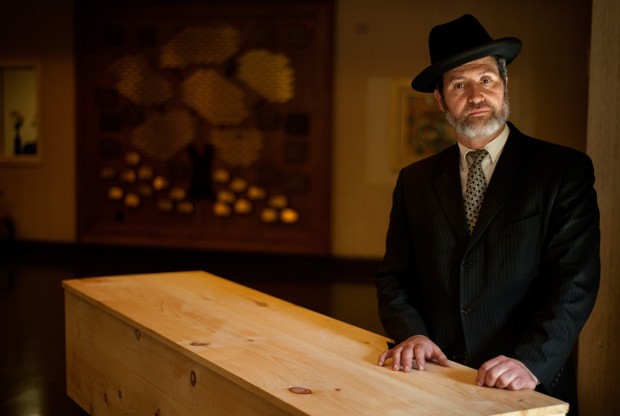
ared according to Jewish law.
One important responsibility is washing and dressing the body and protecting it until the funeral takes place.
Orthodox Vs Reform Judaism Rituals
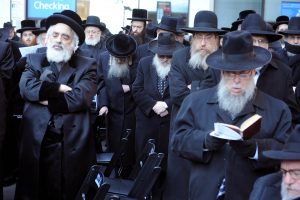
Orthodox Jewish Men
The three denominations within Judaism are reform, conservative, and orthodox.
The differences largely depend on the degree to which they observe traditional beliefs.
Reform Judaism
Reform is the most modern, free-thinking, and less observant of traditional Jewish law.
Orthodox Judamism
Orthodox have strict observance of Jewish law.
Conservative Judaism
Conservatives are somewhere between the other two.
The Usual Funeral Process
The Hebrew word for funeral is levaya, which means honoring the deceased by accompanying them to their grave.
The funeral will take place at a synagogue, funeral home, or the entire process may happen at the cemetery. The process can vary, but there are a few standard elements.
Time Between Death and Burial
As soon as possible after death, the Rabbi or funeral home should be contacted, so that the arrangements can begin. A speedy burial is extremely important.
It’s believed that this is one of the most important ways to honor the deceased.
Within 24-hours is preferred, if it’s possible.
They feel that it disrespects the dead to leave the body unburied.
Immediately after death a few rituals are performed, which will be discussed in more detail later.
During the Funeral
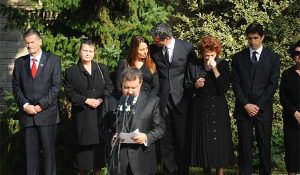
Jewish Funeral Prayers & Eulogies
The funeral usually begins with several readings. Afterward, the eulogies are read and then the memorial prayer is last.
At that time, the deceased is moved to the gravesite.
Funeral Prayers
One of the most popular memorial prayers asks God to grant perfect peace to the departed and to remember their good deeds.
Readings at the beginning of the funeral are frequently Psalms 23, 15, 24, 90, and 103. Eulogies are read by the rabbi as well as a few family members.
Dignity Memorial Jewish has many prayers for this occasion.
The Casket

Jewish Casket
It is mandated by Jewish law that the casket must be a simple box, preferably made from pine with no metal.
Sometimes holes are cut at the bottom, in order to hasten the decomposition of the body.
Common questions about a Jewish Funeral
Below are answers to the most commonly asked questions.
How long does a Jewish Funeral last?
The time can vary depending on whether the deceased was a well-known person or not, the number of people who will speak, and the wishes of the family.
However it is rarely longer than one hour.
Is the Funeral in Hebrew?
A Jewish funeral is likely to be in both English and Hebrew. In some cases, there may be a book that translates the Hebrew to English. It depends on the denomination and the family’s wishes.
Can Jews be Cremated?
Whether cremation is allowed usually depends on the sect of Judaism observed.
Orthodox, does not allow cremation. They believe the body should be buried intact.
Reform Judaism has become open to the cremation process, and Rabbis are usually willing to officiate at a funeral or burial.
Although conservative denominations are still opposed to cremation, the Rabbi may still officiate at the funeral for the ashes, but rarely at the burial.
Can they be Embalmed?
Unless required by law, embalming or cosmetic procedures are not allowed.
The same goes for autopsies, however if it is mandated by law, a rabbi may be present if possible.
Why do Jews cover mirrors when someone dies?
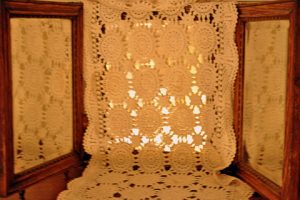
Covering Mirrors After Death
This tradition is from very old customs and superstitions. There are many opinions about the significance of this action.
It is thought that the mourners should concentrate on God and on the soul of the departed instead of dwelling on their own vanity.
Jewish Burial
After the conclusion of the funeral, the casket is carried by hand to the burial site if possible, usually by family and close friends.
Being a pallbearer is considered a great privilege.
Burial Time: What does Jewish Law state?
As mentioned, Jewish law mandates that the burial should take place within 24 hours after death. However, this is not always possible.
Funerals are prohibited on the Sabbath, therefore it’s allowable to wait until Sunday.
Other reasons for delay would be if close relatives must travel from abroad and it will take more than 24 hours.
Burial is also not allowed on some Jewish holidays.
Other Burial rules and customs

Placing Stones on Headstones
Time of Death Rituals
After death, the entire body must be washed thoroughly. It is then submerged in water or it’s poured over the body, which is a ritual bath called “taharah”.
The deceased is then dressed in white burial shrouds.
However if the deceased was injured and there is blood on the clothing, then the washing is not completed.
Their belief is that a person’s blood is just as important as his life and should be buried with the body.
After Death Rituals
As soon as death occurs, someone must guard (A guard is called a Shomer) the body at all times until the funeral, frequently done by the Chevra kadisha.
In some denominations, the immediate family members tear their clothing to symbolize their loss.
Burial Rituals

Family and Friends Escorting Casket
Those who will not attend the burial may escort the casket for a short distance, as it’s carried to the gravesite.
The pallbearers stop seven times on route to the burial site, symbolizing their reluctance to let go of their loved one.
If you are ever at a Jewish cemetery, you will likely notice stones that have been placed on the grave markers.
People have varying reason for this ritual. It tells someone visiting the grave that other mourners have been there as well.
Others feel that it means they are never finished building a monument for the departed.
Burial Service

Ripping of Clothing
At the gravesite, the mourners sit and the attendees stand around the grave. If the tearing of their clothing was not done before, the Rabbi sometimes does it for them at that time.
Prayers
Someone chants from Psalms while the casket is lowered into the grave. At that time the Rabbi recites, typically in Hebrew, “May he or she go to his or her resting place in peace.”
The mourners then stand and say the Mourner’s Kaddish, which reaffirms their belief in God. As they pass, they fill the grave with dirt by passing a shovel to one another.
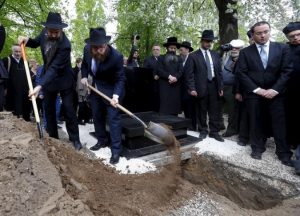
Family Filling Grave
Burial Rituals
They must use the convex side of the shovel. The shovel cannot be passed hand to hand, but should be placed into the dirt and then retrieved by the next mourner.
Some take grass from the ground and throw it behind them. This signifies their renewed awareness of their own mortality.
Jewish Wake
It would be rare for a wake or visitation to take place, due to the urgency to bury.
Instead, the family gathers and tears their clothing in a visible place such as a lapel or pocket. This symbolizes that they are in mourning.
This is sometimes done at the gravesite by the rabbi or a piece of black torn material is pinned to their clothing.
Mourning & Bereavement Customs

Family Lowering Casket into Grave
There are two periods of mourning.
What is Shiva?
Shiva meaning seven, is the first period of mourning. It begins immediately after burial and lasts for seven days.
During this time, the family does not participate in their normal daily routine, which includes going to work.
A candle is also burned for the entire duration of shiva.
What is shloshim?
The second mourning period is shloshim, meaning thirty, which begins the first day after the funeral.
Family resumes their daily routine, but will recite Mourner’s Kaddish, also known as the mourner’s prayer for 30 days.
If the deceased is a parent, the Kaddish is said for one year.
Funeral Etiquette
If you’re attending a Jewish funeral and unfamiliar with the customs, below are a few tips on proper etiquette.
Clothing
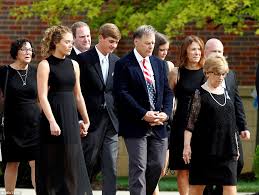
Proper Jewish Funeral Attire
The best thing to remember is to dress conservatively.
Men
Men should wear a jacket, tie, and a yarmulke, which is a head covering.
Women
Women should wear a skirt or dress with a length that reaches at least below the knee and their shoulders must be covered.
Women should not wear open-toe shoes. A head covering is typically not necessary.
What to say at a Jewish funeral?
You’re not expected to say anything during the funeral, which mainly consist of prayer.
When speaking to the bereaved, simply express your sympathy for their loss and perhaps say something nice about the deceased.
What Not to Say
As with any religion, don’t inquire about the cause of death or try to comfort by saying things such as, “I know how you feel.”
What to bring to a Jewish funeral?

Jewish Shiva Food
Flowers are not generally part of a Jewish funeral, so they shouldn’t be sent or brought to the funeral.
After the burial, the family is in mourning and they abstain from their normal daily duties, including cooking. Therefore, bringing food is an excellent option.
It may be a good idea to inquire about the types of food to bring. A basket containing baked goods, dried fruit, chocolate, and nuts, is a very nice choice.
What do you send if not attending?
Contributing to a charity, such as the United Jewish Appeal, would be an excellent gesture. Many people send a condolence card as well.
Remember, a Jewish funeral is a quiet and somber occasion. It’s good to keep that in mind when attending the funeral, expressing condolences, or giving gifts.
Because they are in mourning and unable to do their normal chores, it could be most useful if you offered your services in some way.
Cleaning the home, preparing meals, or even babysitting could be a great comfort at their time of loss.



Thanks for explaining how cremation is increasing in popularity. My sister is thinking about getting a kaddish for her funeral. It was interesting to learn about burial rituals.
Does Jewish burial laws permit a grave to accommodate more than one coffin.
For instance can a wife and daughter be buried in the same plot?
i await your response Thank you
My grandparents are buried in the same plot. When we organized my Dad’s service, I asked if he could be buried in that plot as well but they told me it was not possible. They only accept up to two people depending on the relationship and gender. I cannot confirm if mother and daughter could be buried together.
I found this very informative and educational and I have tried to raise my children to have knowledge and be respectful of others religious beliefs, many thanks.
sounds like it makes sense. i wonder about the ethics of burial being a Christian. the Jews were first and we both Believe the Old testament. maybe since i don’t have much money i can build a pine box and get it to specs, have someone put me in it after they are sure i am dead after washing me good with some clear clean water. i will try to get the man in town with a backhoe to dig me a hole(before I die of course and assuming he is still alive). After that I will rot without formaldehyde to preserve me and the worms will crawl in and out and play pinochle on my snout. after a year or two all that will be left are bones teeth , fingernails, and hair. I will be glad to not be rotting anymore and ready to be raised up by Jesus to face judgement. I will hope it is the judgement seat of Christ and not the Great White Throne. this is something that i just can not dismiss as ritualistic and religious but hold to be Holy. I’ m then glad i was not cremated. It is hard to imagine how you will be raised if you are anailated to ashes.
Yes , Per Jewish law two in one grave is allowed if they are ‘two hand withs apart’
The Jewish Cemetery in Stockton Ca allows this,
Sheldon Barr Superintendent of Temple Isreal Cemetery in Stockton CA. The oldest Jewish cemetery in continuous use West of The Rockies
I found this article to be very informative. I am a 72 year old Black women and often wondered why Jewish people required burial of their loved ones within 24 hr. upon death. This article not only answered that question but provided a lesson on some basic facts related to Jewish culture. Thank You.
Very interesting to learn about funeral rituals depending on one’s religion. Jewish people,like Hindus, use rituals that have existed since time began and these are a continuation of how important issues of life and death continue in modern times. I am particularly impressed with Jewish rituals,despite the simplicity of the burial itself, and the fact no metal is used and the casket is of simple pinewood. Stones rather than flowers are a reminder that the deceased is not forgotten and that to me is a very touching matter.
poignant reminder that loved ones are never forgotten as in life but also in death.
Do I take my own stone to a Jewish burial?
You can pick up stones from nearby ground
at many Jewish Cemetaries there will be a small basket of stones near the entrance. Because of the ritual of leaving stones upon the headstone, the grounds around may have been literally picked clean by past mourners.